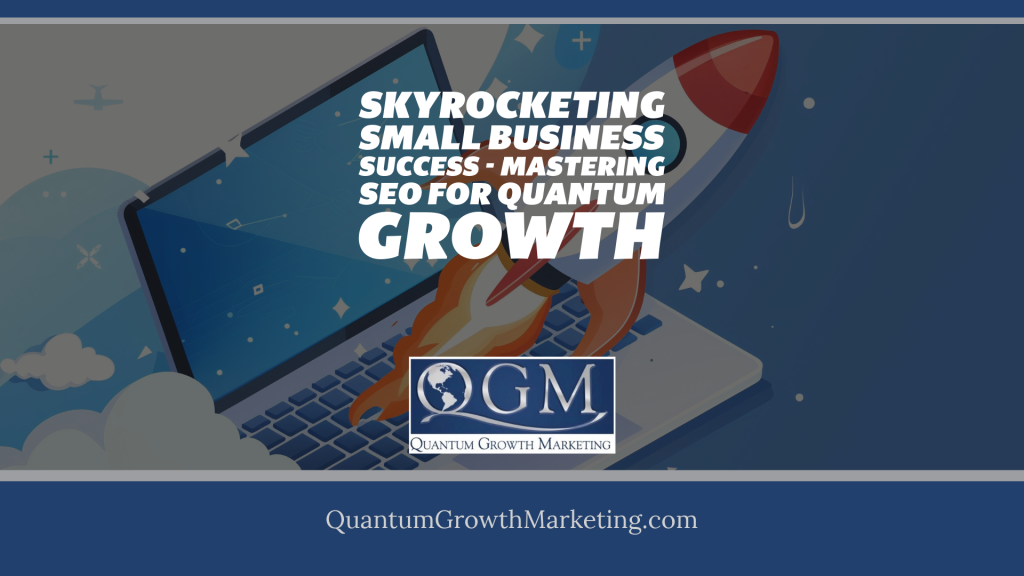
Skyrocketing Small Business Success: Mastering SEO for Quantum Growth
In today’s digital landscape, small business owners face fierce competition to stand out online. One of the most powerful tools to achieve quantum growth—exponential, game-changing expansion—is a well-executed SEO strategy. Search Engine Optimization (SEO) isn’t just about ranking on Google; it’s about driving targeted, organic traffic that converts into loyal customers. For small businesses, SEO can be the difference between obscurity and market dominance. Let’s dive into how you can leverage SEO to propel your business to new heights, with actionable steps, top keywords, and insights tailored for quantum growth.
Why SEO Matters for Small Business Owners
SEO is the backbone of digital marketing for small businesses. With 92% of global search engine market share held by Google (as of recent data), ranking high on search results is non-negotiable. Studies show that 49% of businesses report organic search as their best ROI channel, and for small businesses, the stakes are even higher—75% of owners believe internet marketing is very effective for attracting new customers. SEO allows you to reach prospects actively searching for your products or services, making it a cost-effective way to grow without breaking the bank.
Step 1: Start with Keyword Research for Quantum Growth
Keyword research is the foundation of any successful SEO strategy. Small business owners should focus on long-tail keywords—specific, less competitive phrases that align with customer intent. For example, instead of targeting “digital marketing,” aim for “digital marketing for small business owners” or “affordable SEO services for startups.” Tools like SEMrush, Ahrefs, or even free options like Google Keyword Planner can help identify high-volume, low-competition keywords.
Incorporate top keywords like:
- Small business marketing
- Digital marketing strategies
- SEO for small businesses
- Organic traffic growth
- Local SEO tips
These keywords resonate with small business owners looking to scale. For instance, “local SEO tips” is critical since 28% of local searches result in a purchase within 24 hours. Optimize your website content, meta descriptions, and title tags with these terms to boost visibility.
Step 2: Optimize Your Website for Search Engines
A mobile-friendly, fast-loading website is crucial for SEO success. Google prioritizes user experience, so ensure your site is responsive, has quick load times, and offers easy navigation. Use plugins like Yoast SEO on WordPress to analyze your pages, ensuring proper keyword placement in headers, meta tags, and alt text for images.
Don’t forget local SEO—a game-changer for small businesses. Claim your Google My Business profile to appear in local search results. Add your business name, address, phone number, and customer reviews to build trust and improve rankings. This is especially effective since 75% of local-intent mobile searches lead to in-store visits within 24 hours.
Step 3: Create High-Value Content That Ranks
Content is king in SEO, but it must be valuable and relevant. Small business owners should focus on creating blog posts, how-to guides, and videos that answer customer pain points. For example, a pest control business might write “How to Prevent Common Pests in Your Home,” targeting keywords like “pest control tips for homeowners.”
Google’s helpful content update emphasizes original, user-focused content. Avoid keyword stuffing and instead provide actionable insights. Brands that blog have 434% more indexed pages than those that don’t, leading to more opportunities to rank. Use a mix of formats—videos, infographics, and articles—to engage different audience preferences.
Step 4: Build Backlinks for Authority
Link building is a key off-page SEO tactic. Backlinks from high-authority websites signal to Google that your site is trustworthy. Reach out to industry blogs for guest posting opportunities, or create shareable content like infographics that others will link to. For example, a study by Backlinko showed that building 5,660 backlinks in 30 days significantly boosted rankings—a strategy small businesses can scale down by starting with local directories or niche publications.
Step 5: Track and Scale with Analytics
You can’t achieve quantum growth without tracking your progress. Use tools like Google Analytics (GA4) and Search Console to monitor traffic, keyword rankings, and user behavior. If a blog post on “SEO for small businesses” is driving traffic, double down by creating related content like “Top 5 SEO Mistakes Small Businesses Make.” Analytics help you focus on what works, ensuring your efforts lead to exponential results.
The Quantum Growth Difference
Quantum growth isn’t just about incremental gains—it’s about leveraging strategies like SEO to create a compounding effect. By consistently optimizing for search engines, small businesses can attract more organic traffic, build brand authority, and convert leads into sales. Unlike paid ads, which stop delivering once the budget runs out, SEO offers long-term, sustainable growth. For instance, a single well-optimized blog post can bring in leads months or even years after publishing.
Final Thoughts
SEO is a powerful digital marketing strategy for small business owners aiming for quantum growth. By focusing on keyword research, website optimization, high-value content, link building, and analytics, you can skyrocket your online presence and drive meaningful results. Start small, test what works, and scale your efforts over time. The digital landscape is competitive, but with the right SEO strategy, your small business can achieve exponential success.
by William James Dutton
